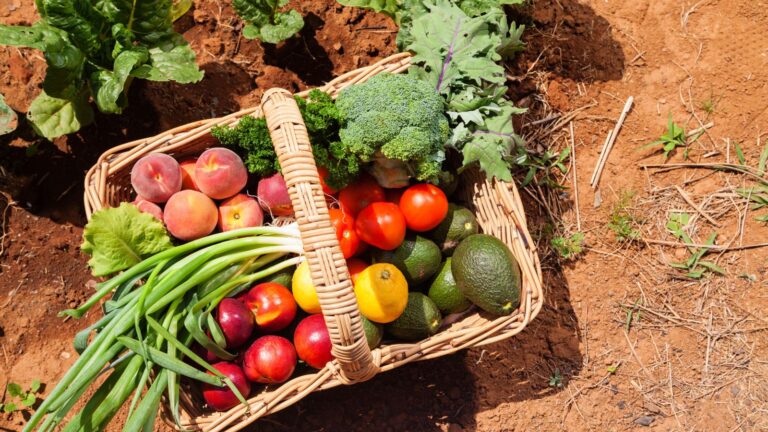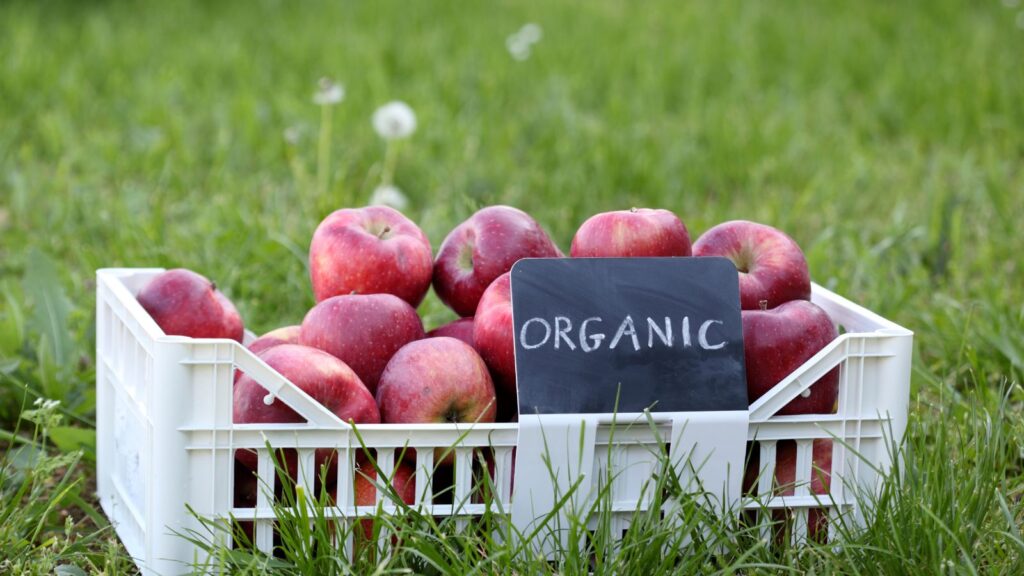
Do you ever wonder about the difference between organic and non-organic fruits at your local grocery store? Amazingly, research suggests that choosing organic fruits can offer more beneficial nutrients, such as antioxidants compared to conventionally grown counterparts.
Our blog will delve into the numerous health, environmental, and economic benefits of selecting organic options over traditional produce. Ready to elevate your fruit intake toward a healthier and sustainable lifestyle?.
Key Takeaways
- Organic fruits contain higher levels of vitamins, minerals, and antioxidants compared to conventionally grown fruits.
- Choosing organic fruits reduces pesticide exposure and the risk of antibiotic – resistant bacteria.
- Organic farming practices support sustainable agriculture, protect soil and water quality, and reduce greenhouse gas emissions.
Health Benefits of Organic Fruits
Organic fruits have higher levels of vitamins, minerals, and antioxidants than conventionally-grown fruits.
Higher levels of vitamins, minerals, and antioxidants
Organic fruits are a nutritional powerhouse for off-grid enthusiasts, providing an increased dose of essential vitamins, minerals, and antioxidants. These beneficial nutrients play crucial roles in our body – from boosting the immune system to aiding cellular repair.
They’re naturally packed into organic fruits as these edibles are grown in rich, chemical-free soils that are predominantly nourished with compost and other organic matter. Compared to conventional counterparts that often rely on synthetic fertilizers, organic fruits have been found to contain fewer pesticides but higher amounts of heart-healthy omega-3 fatty acids according to USDA certification guidelines.
So it’s not just about taste or ethical eating; choosing organics can also contribute significantly towards your well-being by fueling your body with elevated nutrition levels.
Lower pesticide exposure
One of the major benefits of choosing organic fruits is that they have lower levels of pesticide exposure. Conventionally-grown fruits are often sprayed with synthetic pesticides, many of which can be harmful to human health.
On the other hand, organic farming practices avoid the use of these synthetic chemicals and instead rely on natural methods to control pests and diseases. This means that when you choose organic fruits, you can enjoy them without worrying about ingesting harmful pesticides.
Studies have shown that eating organic foods can significantly reduce pesticide exposure in both children and adults, which is especially important for those who value a healthy and chemical-free lifestyle.
Reduced risk of antibiotic-resistant bacteria
Choosing organic fruits can help reduce the risk of antibiotic-resistant bacteria. Conventionally grown fruits often contain residues of antibiotics that are used in farming practices to prevent and treat diseases in animals.
These antibiotics can enter our food chain and contribute to the development of antibiotic resistance in bacteria. Organic farmers, on the other hand, do not use antibiotics in their farming practices, which means that organic fruits have a lower risk of being contaminated with antibiotic-resistant bacteria.
By choosing organic fruits, you are making a healthier choice for yourself and supporting sustainable agriculture practices that prioritize long-term human and environmental health.
Environmental Benefits of Choosing Organic Fruits
Choosing organic fruits supports sustainable farming practices, protects soil and water quality.
Supports sustainable farming practices
Choosing organic fruits supports sustainable farming practices. Organic farmers use natural methods to grow their produce, without the use of synthetic fertilizers or pesticides.
This helps protect the soil quality and promotes biodiversity by maintaining a balanced ecosystem. Furthermore, organic farming reduces reliance on non-renewable resources and decreases greenhouse gas emissions, contributing to a healthier planet overall.
By choosing organic fruits, you are not only prioritizing your health but also supporting farmers who prioritize sustainability and environmental conservation.
Protects soil and water quality
Choosing organic fruits not only benefits your health, but also plays a crucial role in protecting soil and water quality. Organic farming practices prioritize the use of natural fertilizers and soil amendments like organic matter and green manures.
By avoiding synthetic pesticides, herbicides, and genetically modified organisms (GMOs), organic farmers help to maintain the balance of beneficial microorganisms and nutrients in the soil.
This sustainable approach promotes healthy soil structure, prevents erosion, and reduces chemical runoff that can contaminate nearby bodies of water. Additionally, by avoiding harmful chemicals, organic farming helps to preserve biodiversity by supporting a wide range of beneficial insects, birds, and other wildlife that contribute to ecosystem stability.
Reduces greenhouse gas emissions
Organic fruit production also has a positive impact on reducing greenhouse gas emissions. Organic farming practices prioritize the use of natural fertilizers and organic matter, which helps to increase soil carbon sequestration.
This means that organic farms can store more carbon in the soil, reducing the amount of greenhouse gases released into the atmosphere. Additionally, organic farmers avoid using synthetic pesticides and fertilizers that are energy-intensive to produce and release significant amounts of greenhouse gases during their manufacturing process.
By choosing organic fruits, you are supporting a farming method that actively works towards combating climate change and reducing our overall carbon footprint.
Economic Benefits of Organic Farming
Organic farming supports local farmers, creates job opportunities, and promotes biodiversity. Read on to discover the positive economic impact of choosing organic fruits.
Supports local, small-scale farmers
Choosing organic fruits supports local, small-scale farmers who often face challenges in competing with large industrial farms. By purchasing organic produce, you are directly contributing to the livelihood of these farmers and helping them sustain their businesses.
Unlike conventional farming methods that rely on synthetic fertilizers and pesticides, organic farming relies on environmentally friendly practices such as crop rotation and natural pest control.
This not only promotes biodiversity but also helps maintain the health of the soil for future generations. Additionally, choosing organic fruits ensures that your food is free from harmful chemicals, promoting a healthier lifestyle for both yourself and those working on these farms.
Creates job opportunities in organic agriculture
Organic agriculture not only benefits our health and the environment, but it also creates job opportunities in the farming industry. By choosing organic fruits, you are supporting small-scale farmers who use sustainable practices to grow their crops.
These farmers often rely on manual labor instead of relying heavily on machinery and chemicals, which means they need more hands-on deck to tend to their fields. Additionally, as the demand for organic produce increases, more jobs are being created in areas such as organic certification agencies, distribution centers, and even delivery services.
So by choosing organic fruits, you not only make a healthier choice for yourself but also contribute to the growth of a thriving job market in organic agriculture.
Promotes biodiversity
Organic farming practices promote biodiversity, which is essential for a healthy and balanced ecosystem. By avoiding the use of synthetic pesticides and chemical fertilizers, organic farmers create habitats that support a wide range of organisms, from insects to birds and microbes.
This diversity helps maintain natural pest control, as beneficial insects like ladybugs can thrive and keep pests in check. Furthermore, diverse ecosystems are more resilient to climate change and other environmental challenges.
So when you choose organic fruits, you’re not just benefiting your health but also supporting the preservation of our planet’s rich biodiversity.
How to Choose Organic Fruits

To choose organic fruits, look for the USDA organic certification label, buy locally grown organic fruits when possible, and consider shopping at farmers markets or joining a community-supported agriculture (CSA) program.
Look for the USDA organic certification label
When choosing fruits, it’s important to look for the USDA organic certification label. This label ensures that the fruits have been grown and processed according to federal guidelines, guaranteeing that they are free from synthetic pesticides, antibiotics, and genetically modified organisms (GMOs).
By selecting fruits with this certification, you can be confident in knowing that you are consuming products produced without the use of toxins and harmful chemicals. So next time you’re shopping for fruits, keep an eye out for the USDA organic certification label to make a healthier choice for yourself and the environment.
Buy locally grown organic fruits when possible
Supporting local farmers and buying locally grown organic fruits not only benefits your health, but also the environment. Locally grown organic fruits are often fresher, as they don’t need to travel long distances to reach you, which means they retain more of their nutritional value.
On top of that, supporting local farmers helps to strengthen your community’s economy and preserves agricultural land for future generations. By choosing locally grown organic fruits, you can enjoy the taste and health benefits while making a positive impact on both yourself and your community.
Shop at farmers markets or join a community-supported agriculture (CSA) program
For those interested in off-grid living, shopping at farmers markets or joining a community-supported agriculture (CSA) program is an excellent way to ensure access to fresh, organic fruits.
Farmers markets offer a wide variety of locally grown produce, including organic options. By purchasing from these markets, you not only support local farmers but also have the opportunity to learn about their farming practices and connect with your community.
Similarly, CSA programs allow you to become a member of a farm and receive regular deliveries of fresh organic fruits directly from the source. This not only guarantees the freshness and quality of the produce but also supports sustainable agriculture practices.
Conclusion
In conclusion, choosing organic fruits offers numerous benefits for both our health and the environment. Not only do they contain higher levels of essential nutrients and antioxidants, but they also reduce our exposure to harmful pesticides.
By supporting organic farming practices, we can protect our soil and water quality while promoting sustainable agriculture. So next time you go grocery shopping, consider reaching for those USDA certified organic fruits to nourish your body and contribute to a healthier planet.
FAQs
1. What are the benefits of choosing organic fruits?
Choosing organic fruits offers several benefits, including reduced exposure to synthetic pesticides and chemicals, higher nutrient content, better taste and flavor, and support for sustainable farming practices.
2. Are organic fruits more expensive than conventionally grown ones?
Yes, organic fruits tend to be more expensive than conventionally grown ones due to the higher costs associated with organic farming practices and certifications. However, the price difference can vary depending on factors such as location and availability.
3. Is it worth it to choose organic fruits?
Choosing organic fruits is a personal choice based on individual preferences and priorities. While they may come at a higher price point, many people believe that the potential health benefits and environmental considerations make it worth the investment.
4. How can I ensure that the fruits I’m buying are truly organic?
To ensure that you are purchasing genuine organic fruits, look for products labeled with an official certification logo such as USDA Organic or Certified Organic by a reputable certifying agency. Additionally, shopping at trusted sources like certified farmers’ markets or directly from local growers can provide added assurance of authenticity.